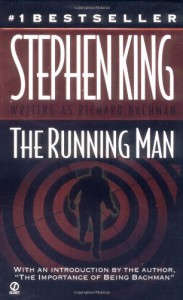Gurglings of a Putrid Stream
Thoughts on books and other assorted topics.
See also: http://goppf.wikidot.com/swstart
My name: Brian Martin
The Running Man by Stephen King

Stephen King has said that he wrote The Running Man in a week. He didn't mention whether it was during his sleep.
I've only read two of his Richard Bachman books (the other was Rage) and neither is good. This one, at least, isn't as offensively bad as his first. It's just silly, pointlessly angry, and full of cardboard.
Set in 2025, when white men are still called "honkeys" and people still ask if you can "dig it," the story follows Ben Richards, an out of work revolutionary whose wife is a prostitute and whose 18-month-old baby is dying from pneumonia. Desperately needing money to buy medicine for the little tyke, Richards applies as a contestant for a popular game show called "The Running Man." The show is a way of ridding society of some of its more undesirable elements. Contestants are given a 12-hour head start (if they live long enough, they can go anywhere in the world), then pursued by merciless Hunters. Every hour they stay alive nets them a hundred bucks, which in this society is a lot of dough. But the game, as Richards discovers, is rigged. Each contestant must record two 10-minute video clips a day and post them to the Games office, where the postmarks are used to locate the runner.
It's unclear how or why "The Running Man" is a popular show. Though frowned upon, it isn't against the rules for the runner to take out innocent bystanders. In our present age of reality shows, a stray anti-homosexual comment by a reality star can start a firestorm of controversy -- let alone the murder of a cop or a civilian. Here, killing a cop is worth another hundred bucks. King, mired in the late sixties/early seventies, takes the hippie hatred of cops to a new level: everyone hates them, deriving entertainment from their deaths. Why anyone would want to BE a cop in this society is another matter. The whole milieu is contradictory and self-serving.
One funny segment has Ben helped out by what passes for the book's only really sympathetic character, Bradley, a young black man and gang-member who tells him how the upper classes are systematically polluting the poor workforce with toxic air which they themselves are able to filter out with nose-plugs. No mouth-breathers over the poverty line, I suppose. And no one smart enough to realize that murdering your workforce is probably a bad idea, unless you want to do the work yourself. I don't think King ever tells us the name of Bradley's gang, but we can figure it out from the way they get all their information: they're the dreaded and feared Library Gang. (Bradley's mom is a hoot. She has no trouble pronouncing "carcinogens," but "pooberty" gives her fits.)
This is a race for Ben's life (and the life of his daughter); it should be exciting. Like Rage, though, King substitutes an amorphous anger for anything truly stirring. That might work for teenagers, but adults can see through it all too easily. Ben's own anger is so self-defeating, for example, that he tends to get himself fired for insubordination rather than sucking it up to (a) keep his wife off the streets and (b) provide for his daughter. We're not supposed to hold him accountable for this, though, because he's a "righteous" man (another favorite word of King's that actually doesn't appear here so far as I can remember). He fights for justice, if not the American way.
It all leads to a comic book ending, with lots of blood and wet, hanging entrails. If that's your thing, you may get a kick out of it.
To paraphrase King himself, two examples of the humorless thudding tract school of horror writing are his own Rage and The Running Man.
 2
2
![Dawn of the Planet of the Apes [Blu-ray] - Keri Russell](http://booklikes.com/photo/max/50/80/upload/books/2/c/2cbbba26ba6981bcf1027a4a109168d9.jpg)
![Age of Tomorrow [DVD] [Region 1] [US Import] [NTSC] - Robert Picardo, Kelly Hu](http://booklikes.com/photo/max/50/80/upload/books/0/e/0e28e61992d2afc9aac2c3f2864c6692.jpg)
